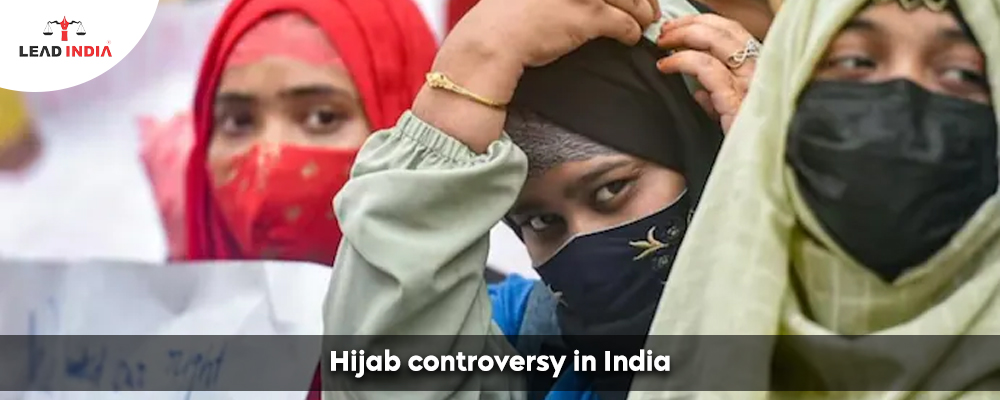The hijab, a Muslim women’s covering, has sparked discussions around the world, including in India. It’s more than just a piece of fabric; it represents tradition, modern life, and identity. The term “hijab” derives from Arabic and means covering. While some argue that it is a religious duty, cultural and historical contexts impact interpretations.
Two major challenges arise: Muslim women are becoming increasingly visible in Western countries, which raises concerns about Islam’s role. In Muslim societies, the hijab reveals serious identity issues and is viewed as a symbol of Muslim identity. But hijab is more than just clothing; it is about modesty and respect. It works as a barrier to unwelcome attention, preserving dignity.
In India, where numerous religions coexist, the constitution guarantees religious freedom to all. However, this freedom cannot be absolute; it must adhere to public order and morals. Over time, courts have clarified these freedoms, ensuring that religious practices do not hurt or disrupt society. The law seeks to strike a balance between private convictions and the community good, whether through the use of loudspeakers for prayers or rites.
Need A Legal Advice
The internet is not a lawyer and neither are you. Talk to a real lawyer about your legal issue

Hijab controversy
The Karnataka hijab controversy erupted after many female Muslim students at a government pre-university college in Udupi district were prevented from attending courses while wearing hijabs. The college administration cited a dress code provision that prevented students from wearing religious symbols or attire. This provoked protests and debates about religious liberty and secularism in India.
The scandal erupted after similar occurrences were reported from other Karnataka educational institutions, sparking extensive debate across the country. The Karnataka High Court took up petitions challenging the prohibition on hijabs in educational institutions.
However, the Karnataka High Court upheld the prohibition on hijabs at educational institutions, stating that hijabs are not an integral aspect of Islam and so are not protected under the basic right to religion. It declared that the state government had the jurisdiction to restrict attire within educational institutions while respecting individuals’ rights to speech and privacy, however, this regulation only extended to classrooms. The court upheld the government’s February 5 order, which required people to wear prescribed uniforms or attire that did not disrupt public order. The dispute erupted after Muslim students were denied admission to classrooms because they wore hijabs, prompting petitions contesting the prohibition.
The court considered four major concerns, including whether wearing hijabs is an essential religious practice, the legitimacy of requiring school uniforms, the validity of the government’s directive, and disciplinary proceedings against school officials. It determined that hijab prohibitions were not discriminatory and affirmed institutes’ authority to impose uniforms. Furthermore, the court expressed worry that external forces were worsening social unrest relating to the hijab dispute and urged a prompt inquiry.
Hijab cases In India
- Amna Bint Basheer v CBSE, 2016 (2) KLT 601: The Kerala High Court looked into the matter further in Amna Bint Basheer v CBSE (2016). The Court ruled that wearing a headscarf is a vital religious practice but did not overturn the CBSE ruling. The court again approved the “additional measures” and safeguards put in place in 2015.
- Fathima Thasneem v. State of Kerala (2018): The right to create, govern, and administer an institution is considered a fundamental right. To protect the dominant party’s interests, the court must strike a balance between competing fundamental rights. A single bench of the Kerala High Court ruled that the collective rights of an institution will take precedence over the individual rights of the petitioner.
- Resham v State of Karnataka (2018): The court ruled that Muslim women’s wearing the hijab is not an essential religious practice in the Islamic faith. The court also ruled that requiring pupils to wear school uniforms is a fair and legally valid restriction to which students cannot complain. The court dismissed the petitioners’ writ petitions as meritless and unsustainable.
- Aishat Sifha vs. State of Karnataka (2022): The Supreme Court’s division bench, consisting of Justices Hemant Gupta and Sudhanshu Dhulia, issued a split decision. Because they couldn’t agree, the Court sent the case to a bigger bench for decision. Justice Gupta affirmed the government order, finding that it controlled rights during school hours for uniformity and equality, under Article 14. He concluded that it did not breach Articles 19(1)(a) and 21 regarding freedom of expression and privacy. On the contrary, Justice Dhulia ruled that the order was illegal, claiming that it violated Article 19(1)(a) and Article 21, as it impacted students’ fundamental rights to privacy and dignity, particularly female students wearing hijab. He disagreed with the High Court’s interpretation, emphasizing the importance of a fair explanation for such restrictions, which the state could not offer.
Lead India provides free legal advice, internet information, and other legal services. We provide a forum to talk with a lawyer and ask legal questions. Lead India’s solicitors can help you with any legal difficulties. Lead India’s solicitors can help you with any legal concerns. Lead India also offers free online legal help in India. In addition to providing online legal aid, Lead India allows users to ask specialist inquiries for free.





 Talk to a Lawyer
Talk to a Lawyer